This post contains affiliate links. We may get paid an affiliate commission if you buy something or take an action after clicking one of the links on this web page.
Last Updated: August 3, 2019
Kickstarter projects – or rather, the resulting products – are rarely featured on this site. The lion’s share of responsibility for that lies with the Kickstarter crew itself: it wasn’t until 2015 that the prohibition on weapons was modified to allow knife-related projects on the platform, after all. That isn’t the only reason, however. Many projects are one-and-done affairs, and even a successful project doesn’t guarantee staying power.
One of those who stuck around is Jason Hui of Prometheus Lights. Now, saying that is a bit disingenuous, as he was in business before the advent of Kickstarter. He was (and is) known for making custom flashlights. His first Kickstarter project, the Prometheus Writes Alpha, was a huge success, and as that project was wrapping up, he launched another: the Beta QR. It was designed to be a keychain light that wasn’t shackled to your keys, and evidently it was a popular idea, as the project beat its $23,500 funding goal five times over. A year or two after that, he updated the design with a new quick-release mechanism, dubbing it the Beta QR V2. That light is the subject of this review.
A quick aside before getting into the meat of the review: I strongly recommend using rechargeable NiMH batteries. Not only will you save money in the long run, but you’ll get better performance along the way. Do not use rechargeable lithium-ion batteries in the Beta QR, and though you can use standard alkaline batteries, be warned that it may corrode the interior of the light over time. Disposable lithium batteries won’t damage the light, but aren’t cheap, either.
General Dimensions and Construction
The Prometheus Lights Beta QR V2 is 2.95” long (3.5” with the QR insert), has a diameter of .55”, and weighs 1.58 ounces including the battery. It’s a compact and pocketable flashlight, even if the brass makes it a bit heavier than one might expect.
Only the brass and copper versions have three output levels, but the real reason I purchased the pricier brass model was simple aesthetics, and the Beta QR has that in spades. Though it arrived with a brilliant polish, it has since developed a patina that looks right at home next to a well-used traditional knife. To put it another way: it wouldn’t look a whit out of place in my grandfather’s tool shed.
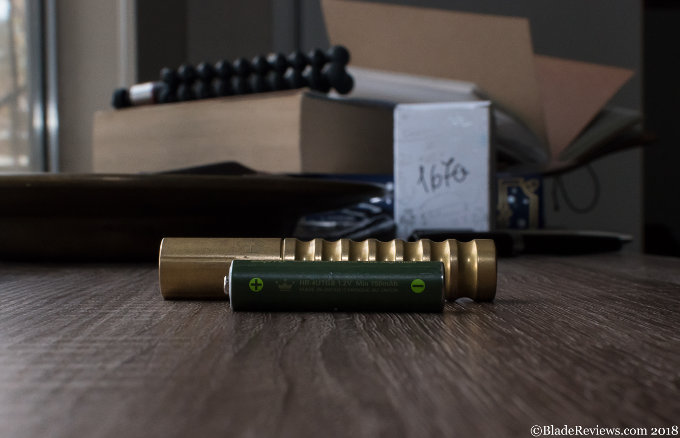
If Jason wasn’t very clear that he has this manufactured in China, I’m not sure I would have been able to figure it out on my own. That’s not to disparage his own machining capabilities, but the level of fit and finish on my Beta QR can only be described as immaculate. The threads are smooth, the beam is clean, and it doesn’t rattle or flex in any way. A bit of online research suggests that this is the rule, not the exception to it.
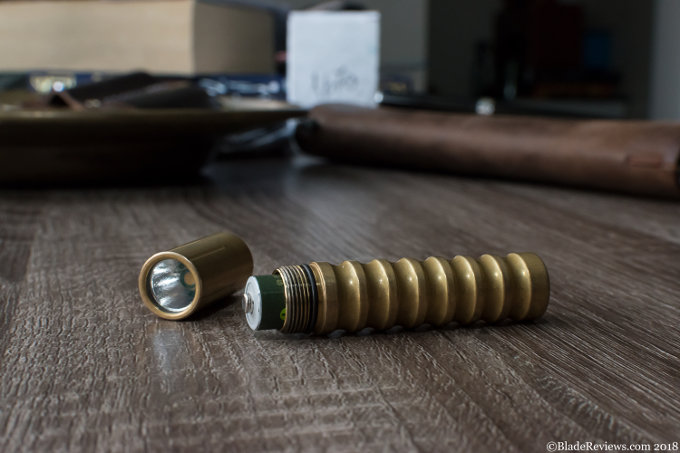
Output, Runtime, and UI
The Beta QR has three output levels: 1 lumen, 15 lumens, and 80 lumens. In an age where thumb-sized lights can put out 900 lumens those numbers may not look good, but bear in mind that the Beta QR runs on a single AAA battery, and most other lights in its battery format have similar output levels. For an everyday carry light, these numbers are fine. The low doesn’t wake up my girlfriend if I’m staying up reading, the high is bright enough for any “bump in the night” situations, and the medium can handle everything in between.
As is standard for a light this size, the beam pattern is all flood, losing brightness between 30 and 40 feet. Jason’s choice of the Nichia 219 emitter is much appreciated, as the warmer tones render color far more accurately than a standard blue-tinted emitter.
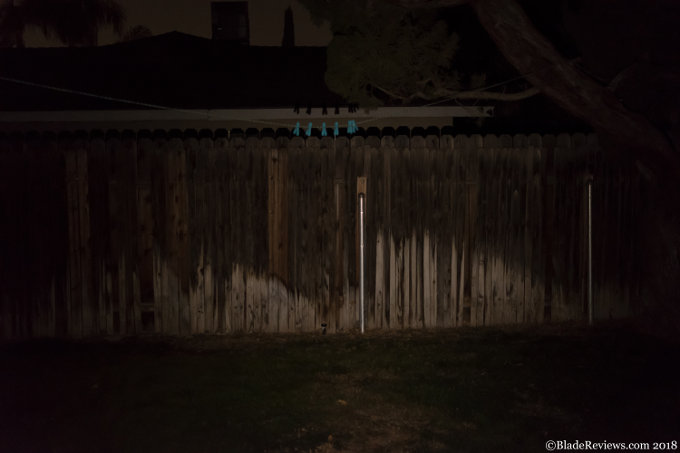
The runtimes on the Beta QR are respectable if not stellar. It can put out 1 lumen for 55 hours, 15 lumens for 4 hours, and 80 lumens for 45 minutes. Practically speaking, I swap out the battery once every few months, but that swap is often precipitated by an event where I’m using the highest setting for an extended period of time. It’s only died on me once while I was using it, but then I was running it on high when medium would have done just as well. I only wish hadn’t made that mistake while I was in the bathroom of a processing plant that lacked power.
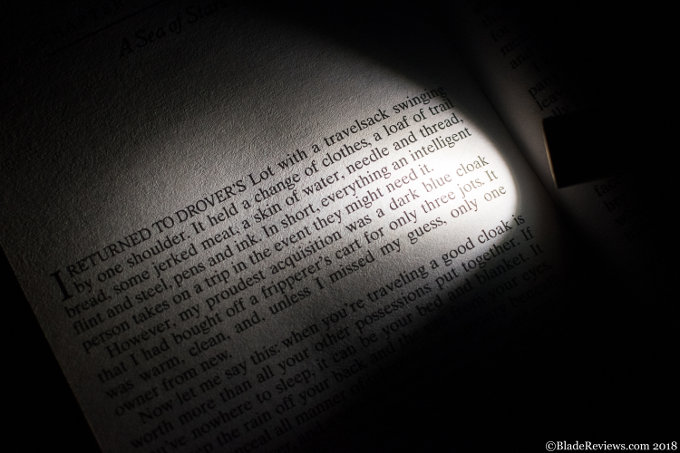
The user interface on the Beta QR is simple: twist once for 1 lumen, twice for 15 lumens, and thrice for 80 lumens. Though not as intuitive as a staged twisty (where all output levels are accessible through a single, continuous twist), it’s easy to use and to explain to others.
Ergonomics and Carry
It shouldn’t come as a revelation that the Beta QR is great in the hand. There are no buttons, crenelations, or awkward pocket clips, and every facet has been debuffed to the point that the brass feels almost soft to the touch. For most people (myself included), it’s a three finger grip, as your middle and ring finger will hold the body tube while your index finger and thumb twist the head. It works just as well in a cigar grip or between the teeth. The scallops on the body aren’t just aesthetic, either: they improve the grip at least as well as knurling would, just with more flair. It tailstands like a champ, but also has a tendency to roll away if left on its side.
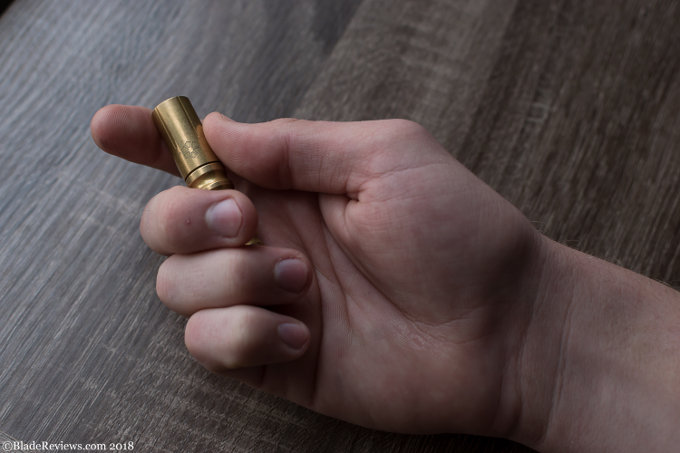
Of course, the real selling point of the Beta QR is the Quick Release. The original used a push button mechanism occasionally seen on keychains, but the V2 features a canted coil spring that significantly improves the design. Instead of a mechanism that needs to be fiddled with, all that’s required to separate the Beta QR from your keys is a firm pull.
The redesign has led to the release of a pocket clip and a prototype flex arm, neither of which would work with the original. Sadly, I have to admit that as cool as the QR is, that’s not how I actually carry it. For the most part, I carry it in a leather slip or just toss it in my pocket. It was thrown on my keys a few times for the sake of due diligence, and there it did fine. Just not my cup of tea.
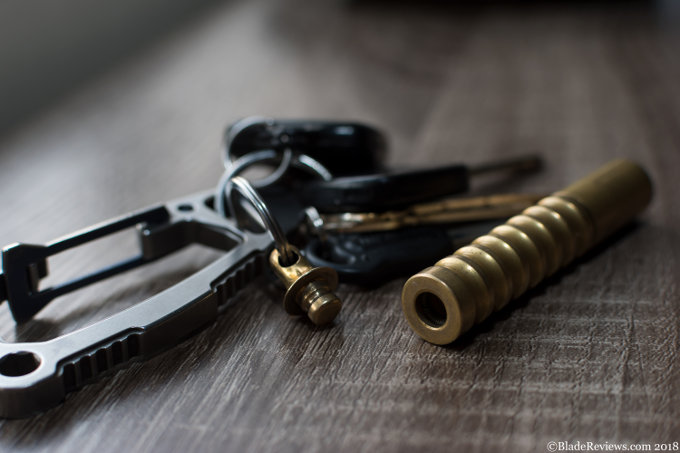
Prometheus Lights Beta QR – Final Thoughts
To recap: the Beta QR is a great light. Full stop. If I had to complain, I’d say that it’s not a terribly ambitious design, but that’s no sin. Judged in a vacuum, it’s practically flawless.
Its shortcomings only become apparent when compared to other 1xAAA lights. Three in particular stand out, the first of which is the SureFire Titan Plus. It boasts a significantly higher lumens count at 300, even if it lacks a true low setting and doesn’t feature a high CRI emitter. The Peak Eiger can get up to 200 lumens and has tons of customization options (plus a bit of cool tech), but is held back by a finicky UI and shorter runtimes. The third is, of course, the Lumintop Worm. Lumintop is likely the manufacturer Jason contracted to produce the Beta QR, and from what I can tell, the Worm predates the Beta QR. It’s not a rebrand: the Worm doesn’t have either iteration of the QR and doesn’t always have a Nichia 219 emitter, but if neither of those matter to you, the Worm might be something to look at.
That said, who would I recommend this light to? This may sound odd, but I think it’s for anyone who wants a 1xAAA light and doesn’t know what they’re looking for beyond that. The Beta QR has everything someone would (and should) expect out of a 1xAAA light, no clear flaws, and an innovative carry option that has tons of unexplored potential. The other options are good, and in some ways substantially better, but compromised in ways that require an informed opinion.
Next up: the Seiko Alpinist.
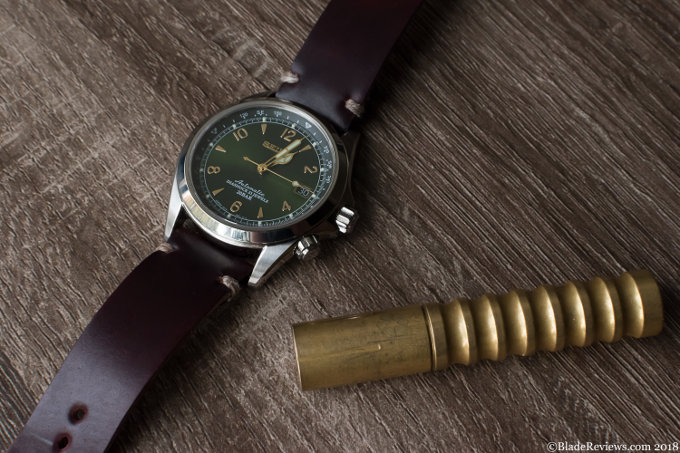
Prometheus Lights Beta QR – From $53.00
From: BladeHQ
- MAXIMUM COLOR ACCURACY: Warm amber light provides high contrast and low interference; Nichia 319A LED emitter has a high CRI of 90+ designed for maximum color accuracy when measured against natural light
- CARRY IT ANYWHERE WITH YOU: Convenient, compact size; Lightweight and reliable flashlight that fits in the palm of your hand; Easily store in your pocket, bag, and more
- QUICK RELEASE FOR EASE OF USE: Detach flashlight from keychain quickly when ready for use; A solid click verifies engagement; Perfect for EDC as there is low risk for accidental disengagement; Push to engage and pull to disengage; Quick release holds up to 10 lb of pull weight
- MULTIPLE MODES FOR ANY SETTING: Low (1 Lumen), Medium (15 Lumens), and High (90 Lumens) modes available; Easily access mode cycling and twist on/off function; Adapts to all needs so that you can use it at home, at work, or in the lab
- BUILT TO LAST: Thoughtfully designed copper flashlight; Premium machine with canted coil spring; Excellent spring tension
I recommend buying the Prometheus Lights Beta QR at BladeHQ or Amazon. Please consider that buying anything through any of the links on this website helps support BladeReviews.com, and keeps the site going. As always, any and all support is greatly appreciated. Thank you very much.
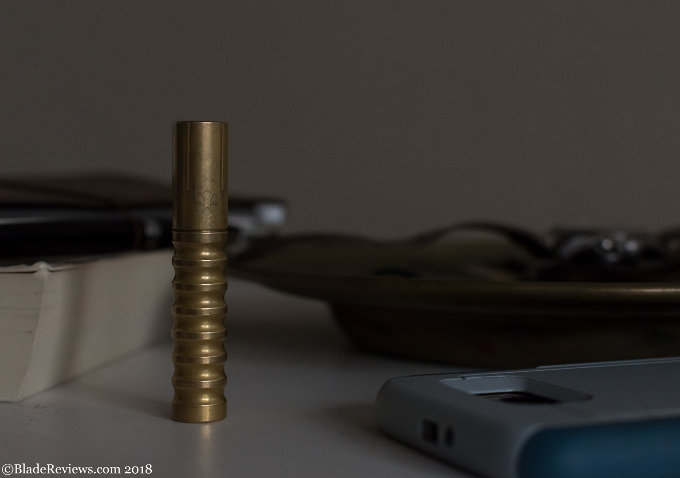

Leave a Reply